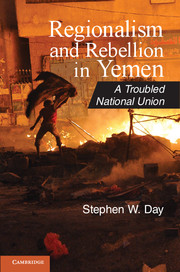Book contents
- Frontmatter
- Contents
- Tables
- Maps and Photos
- Preface
- Acknowledgments
- Abbreviations
- Chronology of Modern Yemeni History
- Glossary of Names of Key Political Figures
- Introduction
- 1 Understanding the Regional Divisions of Yemen
- 2 Two Revolutions, Two Republics
- 3 Salih Family Rules and the Sanhan Tribe
- 4 Unity in Name Only
- 5 The Spoils of Civil War
- 6 A Regime in Control?
- 7 Political Eruptions after 9/11
- 8 The Return of Yemeni Regionalism
- 9 Yemen’s Political Meltdown
- Conclusion
- Appendix
- Bibliography
- Index
- References
Conclusion
Published online by Cambridge University Press: 05 July 2012
- Frontmatter
- Contents
- Tables
- Maps and Photos
- Preface
- Acknowledgments
- Abbreviations
- Chronology of Modern Yemeni History
- Glossary of Names of Key Political Figures
- Introduction
- 1 Understanding the Regional Divisions of Yemen
- 2 Two Revolutions, Two Republics
- 3 Salih Family Rules and the Sanhan Tribe
- 4 Unity in Name Only
- 5 The Spoils of Civil War
- 6 A Regime in Control?
- 7 Political Eruptions after 9/11
- 8 The Return of Yemeni Regionalism
- 9 Yemen’s Political Meltdown
- Conclusion
- Appendix
- Bibliography
- Index
- References
Summary
The removal of Ali Abdallah Salih as Yemen’s head of state was not made official until late November 2011, following sixteen weeks of medical treatment in Saudi Arabia and then his surprise return to Sanaa in September. On November 23, President Salih finally fulfilled his months-long commitment to sign the GCC-sponsored deal transferring real executive power to Vice President Hadi. The signing ceremony required Salih to make a second trip to Riyadh, where he relinquished his powers under the watchful eye of Saudi King Abdallah. Hadi refused to join the disgraced president on his final state visit. Over the past seven years, Salih had shown terribly bad form as the primary contestant in a form of politics where honor and respect can only be won by keeping the peace through clever and confounding ways. The president’s spectacular failure was made painfully clear by a population of millions voicing disapproval in the streets, carrying signs of protest and chanting slogans against the “murderous tyrant.” Until the end, Salih treated the street protests with derision. He felt the same way about the GCC agreement, which he called a coup d’etat and violation of Yemen’s democratic constitution. Over the decades, of course, he had rewritten this constitution to serve his own interests, using powers of decree with questionable backing from parliament and fraudulent public referenda.
- Type
- Chapter
- Information
- Regionalism and Rebellion in YemenA Troubled National Union, pp. 290 - 312Publisher: Cambridge University PressPrint publication year: 2012



